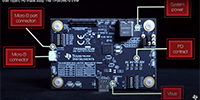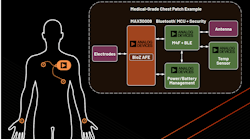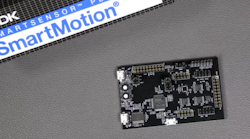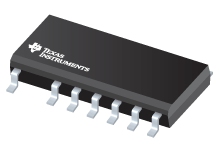Wiliot, a startup developing Bluetooth chips that can be powered by ambient radio frequencies, has raised $30 million in funding from Qualcomm Ventures, Samsung Venture Investment, Avery Dennison and Amazon Web Services, among others. The funding increases the company’s total to $50 million as it moves closer to entering production.
芯片可以对标签一样的小鳍gernail, as thin as a sheet of paper and that incorporate sensors. According to Wiliot, the devices can broadcast data such as location, weight, and temperature over Bluetooth. Wiliot’s technology lets them communicate with smartphones or other Bluetooth devices using energy harvested from WiFi, cellular and Bluetooth—no batteries required.
The sensors can be used in all sort of devices unconnected to the Internet of Things, ranging from spare parts in a manufacturing plant to the packaging around consumer goods. The sensors could be pasted on products during production to track them from the factory to the warehouse to the store. They could also replace clothing tags, giving customers the ability to scan for more details.
"Wiliot's strategy for battery-free Bluetooth transponders, which sense and communicate without needing specific action by consumers, is very relevant to Avery Dennison's intelligent label strategy," Francisco Melo, general manager of Avery Dennison's radio-frequency identification (RFID) unit, said in a statement. Avery Dennision is one of the largest RFID manufacturers in the world.
Wiliot, which has around 40 employees and is based in San Diego, California, is the second company founded by the team behind semiconductor startup Wilocity. The company raised roughly $100 million in investment to build chips based on the next generation WiFi standard - more commonly called WiGig - targeting the personal computer and peripherals markets. Qualcomm bought it for around $400 million in 2014.
"We believe that disposable electronics based on battery-free, low-cost systems are the foundation for future Internet of Things systems," chief executive and founder Ta Tarim said. "Recycling the radiation around us to power sticker-size sensors can enable new ways for consumers to interact with products that were previously not feasible," Tarim, a former vice president of product management at Qualcomm, added.
Wiliot, which has around 40 employees and was founded in 2017, is the latest company started by the founding team behind another startup, Wilocity. The company raised roughly $100 million in investment to build chips based on the next generation WiFi standard - more commonly called WiGig - targeting the personal computer and peripherals markets. Qualcomm bought it for around $400 million in 2014.
Other companies are operating in the energy harvesting chip market. Atmosic Technologies, which was founded by former engineering executives at Qualcomm Atheros, is building Bluetooth chips for consumer electronics such as wearables that are capable of running on radio frequencies directed at them from other Bluetooth devices. The company's chips are not dependent on ambient energy like Wiliot's.


















